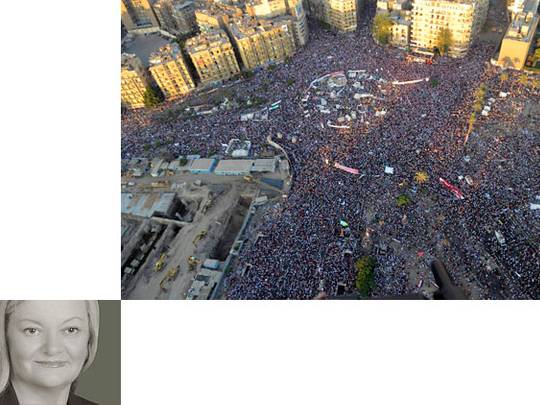
On Friday, up to 35 million Egyptians responded with their feet to the request of Defence Minister Abdul Fatah Al Sisi for a mandate to tackle “violence and terrorism”. The turnout was a message to Muslim Brotherhood supporters camped out in Rabaa Adawiya Square that they could no longer hold the nation’s capital hostage.
The interior minister warned he would use legal means to forcibly break up the protest that infringes the rights of local residents angered over continuous ear-shattering noise, the use of their gardens as toilets, bullets shattering their windows and being frisked by Brotherhood heavies.
Egyptians who stood in searing temperatures to show their support for a soft-spoken army chief with the charisma of Jamal Abdul Nasser, were keen to show the world that they see the army as a saviour and believed Saturday’s newspaper headlines would be a resounding clarion call to western governments to rally behind a country battling to emerge from two-and-a-half-years of turmoil. But due to the Brotherhood’s Machiavellian strategies, those headlines screamed ‘massacre’, a tragic event that was milked for all it was worth by the Brotherhood’s slick-talking young spokesman Jihad Al Haddad whose version of events was quoted in English-language dailies from Los Angeles to London.
Al Haddad is a maestro of propagandist spin using flat-out fairytales to make a point. Just days ago, the Guardian ran one of his columns, while neglecting to mention that he was the Brotherhood’s mouthpiece. His article characterises the massive June 30 protest as a “cinematic production involving the collaboration of an Egyptian movie director and military aerial photography”.
Then, following the early Saturday morning confrontation between the Brotherhood’s Rabaa Adawiya and the police on the 6th October Bridge leading to Tahrir Square, Al Haddad was working the phones putting the death toll at close to 200 even before bodies had been counted and showering western networks with edited videos portraying ‘peaceful’ and ‘unarmed’ Brotherhood supporters under siege.
One death is too many, but Al Haddad’s count was a deliberate exaggeration when, according to official figures, some 75 people lost their lives last Friday countrywide.
Somehow, the Brotherhood has succeeded in placing the foreign media in its pocket and despite its Egyptian channels having been removed from air, Al Jazeera and Iran’s Press TV ensure its carefully crafted narrative reaches western viewers. Egyptians who watch local networks get a very different take. They get to see video evidence of Al Haddad’s ‘peaceful’ legions shooting at rival protesters and police, chopping up pavements to throw chunks of concrete and setting fire to cars. On their screens, they witness the truck loads of weapons originating from Turkey that were intercepted from reaching Brotherhood hands.
They get to see Brotherhood thugs who sought refuge within Alexandria’s Qaid Ebrahim mosque torturing a handful of anti-Mursi demonstrators who had also entered the mosque to find safety. Egyptians get to view men from Rabaa Adawiya carrying a large misshapen object, suspected as being an anti-aircraft gun by weapons experts, into the square. On Saturday, the host of Cairo Today, Amr Adeeb, was apoplectic at the ineptitude of the interim cabinet, he accuses of failing to disseminate the truth on the global stage.
Brotherhood leaders, seen as the power behind Mursi’s presidency, were useless at running the country but are wily at ensuring the organisation’s survival beginning with the Rabaa Adawiya sit-in that keeps their base united. Secondly, although their clerics tell the crowd that the Angel Gabriel (Jibril) is praying alongside them, their narrative for public consumption is based on their readiness to die for democracy.
I saw a young woman wearing a green jihadist headband whipping it off on the orders of an older woman when they were approached by a TV reporter. Many of their supporters in Rabaa Adawiya aren’t Brotherhood faithful but rather wretchedly poor families that by numerous accounts are lured by up to 500 Egyptian pounds daily. Others were prevented from leaving on Friday. Al Jazeera’s camera inadvertently focused on a skirmish when men were heard saying, “Let us go. We want to go home,” before the feed was momentarily cut. Later that night, a speaker ordered the following to detain anyone asking to leave as “a criminal” or “a member of the secret police”.
In reality, the Brotherhood leadership is using women and children as human shields to escape arrest and is sending forth young men to provoke police and soldiers into firing. The police came under attack on Friday; they had to prevent Mursi supporters from reaching Tahrir that would have resulted in an epic bloodbath. Two dozen policemen were injured and one killed. The Brotherhood was warned not to cross, but every death of one of their own is a notch on their victim status. The government is in a bind. On the one hand it is being blamed for allowing the month-long occupation of Rabaa Adawiya to continue; on the other, it is aware that forced evacuation could result in hundreds, if not thousands, of fatalities.
And so the impasse continues to block Egypt’s forward march. In the meantime, Tunisians and Libyans, now calling on their own armies to release them from failed Brotherhood influenced Islamist governments, look anxiously on.
Linda S. Heard is a specialist writer on Middle East affairs. She can be contacted at lheard@gulfnews.com









